 Petzlover
Petzlover Cymric is originated from United Kingdom but Domestic Longhaired Cat is originated from United States. Both Cymric and Domestic Longhaired Cat are of same weight. Cymric may live 5 years less than Domestic Longhaired Cat. Cymric may have less litter size than Domestic Longhaired Cat. Both Cymric and Domestic Longhaired Cat requires Moderate Maintenance.
Cymric is originated from United Kingdom but Domestic Longhaired Cat is originated from United States. Both Cymric and Domestic Longhaired Cat are of same weight. Cymric may live 5 years less than Domestic Longhaired Cat. Cymric may have less litter size than Domestic Longhaired Cat. Both Cymric and Domestic Longhaired Cat requires Moderate Maintenance.
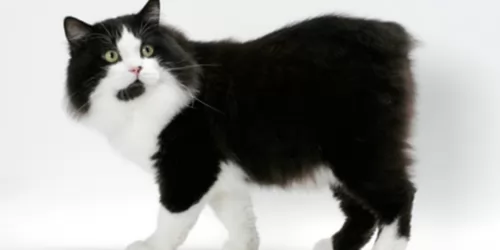 The Cymric is a naturally tailless cat although having said that, not every Cymric is completely tailless.
The Cymric is a naturally tailless cat although having said that, not every Cymric is completely tailless.
It’s actually a long-haired Manx cat this and thought to date back to 1750. It is one of the oldest cat breeds.
Known also as rumpies or stumpies, the taillessness of the Manx an Cymric started as a mutation among the island's domestic cat population. Long-haired kittens were born to Manx cats on the Isle of Man, but in the 1960s, similar kittens were born in Canada and then specifically bred.
The Cymric became popular, even though it took years for the Cymric to be recognized as a breed of its own by cat associations. The International Cat Association (TICA) gave the cat breed status in 1979.
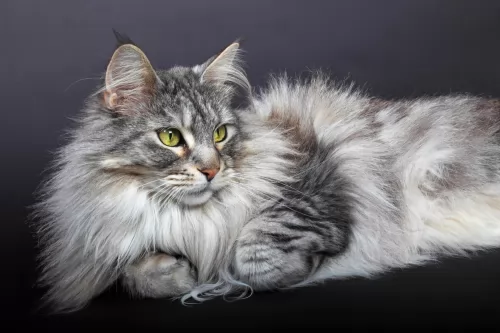 The Domestic Longhaired cat came about because of various attempts by breeders to bring in certain Persian cat varieties in the American Shorthairs.
The Domestic Longhaired cat came about because of various attempts by breeders to bring in certain Persian cat varieties in the American Shorthairs.
The cat comes from champion bloodlines but one of the most remarkable traits of the Domestic Longhair cat is that they are just typical cats with long hair. In other words, Domestic Longhairs are a product of various cat breedings and it is thought they arrived in the USA with the early settlers.
They shouldn’t be confused with the purebred American Longhair cat. The ancestry of the Domestic Longhair cat is unknown but for people who own them, they are a longhaired cat that becomes special to their owners. The cat isn’t recognized by the larger cat organizations.
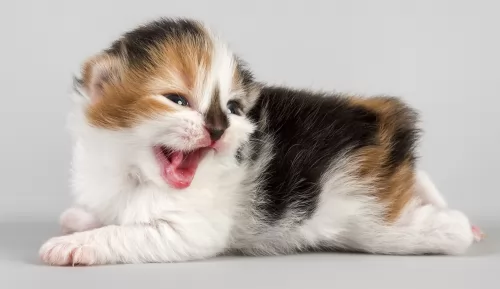 The Cymric is a medium-sized cat that can weight between 4 and 6kg and he is round in shape and stockily built. The back legs are also longer than the front legs.
The Cymric is a medium-sized cat that can weight between 4 and 6kg and he is round in shape and stockily built. The back legs are also longer than the front legs.
He has a short, arched back with a broad rump. The unusual but beautiful Cymric has long hair and a thick double coat that is glossy and vibrant. Some cymrics have tufts of hair on their ears and toes.
All colors of the coat are available and it can be solid or patterned - white, blue, red, black, cream, tortoiseshell etc.
The eyes are large and can be green, copper, or yellow. The ears are widely spaced with rounded tips.
The Cymric is described as a sweet-natured, placid cat that doesn’t get ruffled over much, though he does get excited about his human family.
He tends to be reserved around strangers. He is a loving cat and simply loves being around his human family. He is a strong cat and intelligent too and he is quite capable of watching you and then learning how to open doors and get into cupboards.
He is sociable and talkative too and enjoys ‘talking’ to you, especially when he has attached himself to one member of the family. He thrives on his human family's company and is a cat that provides lots of entertainment for you. Even though he becomes attached to one family member, he gets on well with children and pets in the home.
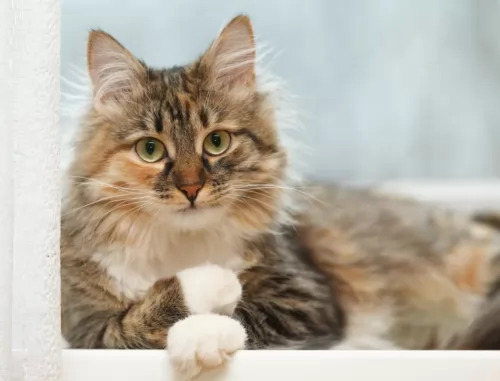 These Domestic long-haired cats are hugely popular in the United States. They can be of any color and the coat can have different patterns too, including bi-color, tortoiseshell and tabby.
These Domestic long-haired cats are hugely popular in the United States. They can be of any color and the coat can have different patterns too, including bi-color, tortoiseshell and tabby.
With his muscled, athletic body he can weigh between 3 and 6kg. He can have a variety of eye colors, ear sizes, and shapes Essentially, their size and shape is influenced by the breed that dominates.
These are just your regular, balanced cats and they make splendid pets for first-time cat owners, single pet owners, those with kids in the home and seniors. You can’t really tell how their personality will be and some will be more quiet than others and some more loving than others too. A lot depends on how you raise- and socialize your cat.
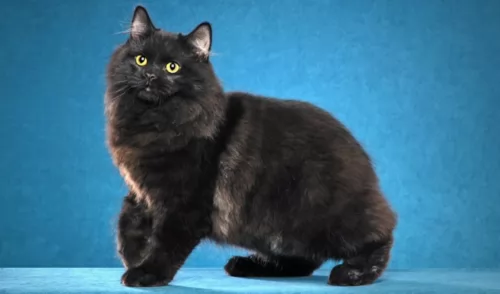 Yes, the Cymric has quite a few health issues but many people choose to overlook these as they love the personality of the lovable cat breed.
Yes, the Cymric has quite a few health issues but many people choose to overlook these as they love the personality of the lovable cat breed.
It’s such an intelligent cat too but best of all it offers total love and companionship.
It is certainly an unusual domesticated cat breed that appeals to many different people and it is guaranteed that you’ll also find him one hang of a feline pet.
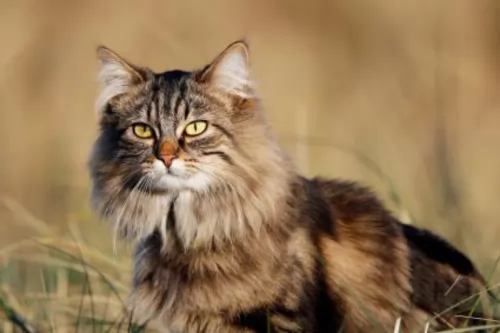 Domestic Longhairs are such wonderful cats and slot into a host of different lifestyles.
Domestic Longhairs are such wonderful cats and slot into a host of different lifestyles.
They are generally content cats with the different lifestyles they find themselves in. Some are smart, some playful, some quiet and some naughty, some are very vocal and some are content to be lap cats.
They're all different but they all have needs and concerns – to be part of a loving human family and to be treated with love, care and respect for the companionship they offer.
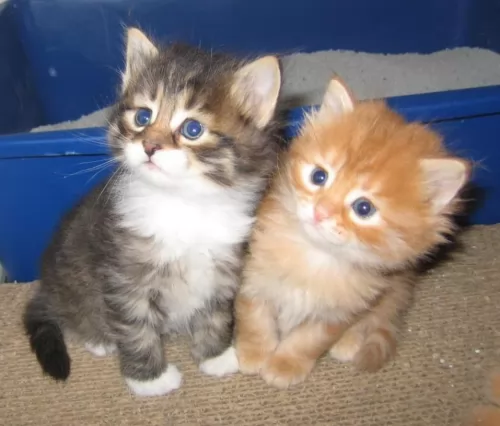 If you look after your Cymric well, he can live to a good age of up to 15 years. The lack of a tail is a genetic defect and the cat’s deformed spine can cause health problems including arthritis.
If you look after your Cymric well, he can live to a good age of up to 15 years. The lack of a tail is a genetic defect and the cat’s deformed spine can cause health problems including arthritis.
In fact, the cat’s lack of a tail causes some serious diseases. The defective gene responsible for the loss of the tail affects the spine and can actually cause spinal problems. In fact, when completely tailless Manx cats mate, the defects can be so severe that some of the offspring are born dead.
People often speak of these health issues of the cat as the Manx Syndrome.
Some cats have a narrowing of the anal passage and this can lead to bowel blockages. Make sure to get your Cymric vaccinated against deadly cat illnesses and ensure veterinary checks for parasite control and illness.
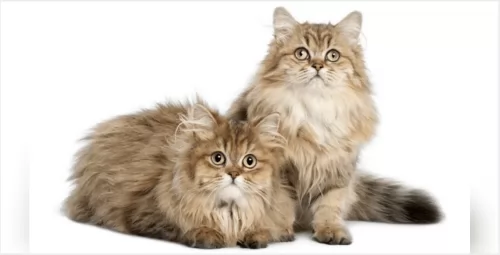 It is their mixed breeding that ensures that the Domestic Longhaired cat doesn’t have any health issues. Like any cat, things such as arthritis, cancer, diabetes and kidney disease can plague your cat.
It is their mixed breeding that ensures that the Domestic Longhaired cat doesn’t have any health issues. Like any cat, things such as arthritis, cancer, diabetes and kidney disease can plague your cat.
A good diet, exercise, lots of love and care can all help to ensure your kitty kat doesn’t succumb to anything that your vet can’t handle.
As soon as your cat shows any sign of illness, get him to the vet. If you look after your cat well, he can avoid a lot of vet visits and can reach 15 to 20 years of age.
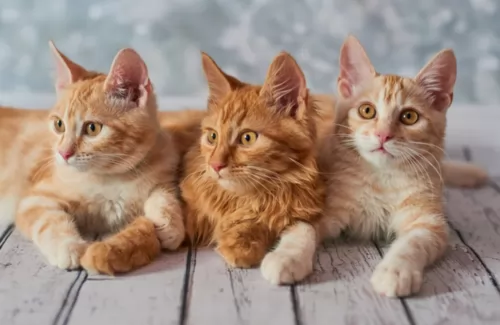 As a kitten, provide your Cymric with food appropriate to its age. Once your cat turns one, you can start feeding him adult cat food. There are a whole lot of excellent commercially manufactured cat foods – dry and canned foo – but always choose a high-quality one where the first ingredients listed are always meat. This is because the cat is a carnivore. Make sure the food has taurine, which is an essential amino acid for cats.
As a kitten, provide your Cymric with food appropriate to its age. Once your cat turns one, you can start feeding him adult cat food. There are a whole lot of excellent commercially manufactured cat foods – dry and canned foo – but always choose a high-quality one where the first ingredients listed are always meat. This is because the cat is a carnivore. Make sure the food has taurine, which is an essential amino acid for cats.
This cat has a thick coat and he will need a brush at least twice a week, especially as he is a high shedding cat. While you brush your cat, look out for any problems such as red areas, hair loss, sores or irritated skin. Take note of any unusual lumps.
Some people take their Cymric to the vet once a year for a routine medical check-up. They have the nails clipped and the ears and teeth checked. It is also a great way to get your queries answered on the nutritional and health needs of your pet.
You will need to have your Cymric’s nutrition checked to keep him in tip-top condition. The Cymric cat has a good appetite and his build can allow him to put on weight easily. Obesity can put pressure on the spine and lead to all kinds of joint problems.
Provide your cat with a litter box and keep it immaculately clean.
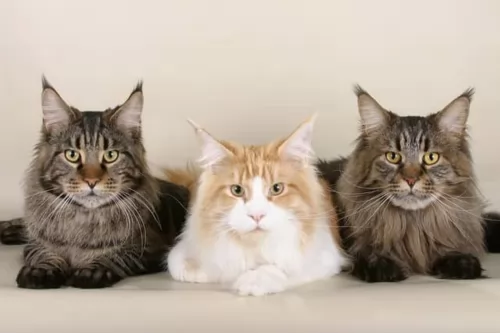 The hair of the Domestic Longhair will need to be tackled and you will need a firm brush to gently brush your cat once a week. This ensures the hair remains silky and tangle-free.
The hair of the Domestic Longhair will need to be tackled and you will need a firm brush to gently brush your cat once a week. This ensures the hair remains silky and tangle-free.
Remember, there are always professional cat groomers who specialize in grooming cats and ensuring their teeth, inside of ears, their nails and their fur is in tip-top condition.
Keeping your cat healthy is always going to require a trip to the vet. Your Domestic Longhair is going to require certain vaccines and deworming to ensure he remains free of deadly cat diseases. Also, if your cat is acting in a lethargic, ‘sick’ way, it could well be a sign that he is ill and a trip to the vet will be imperative as the condition could become worse.
To ensure your cat has the best chance at health, make sure you feed him well. Gut health is absolutely imperative and feeding your cat too many carbs will give him plenty of digestive problems.
A cat is a carnivore – a meat eater – and therefore his food needs to be meat. A kitten will require 4 small meals a day and an adult cat – over the age of 1 year – will require 2 meals a day. Any questions you have about feeding your cat can be answered by your local veterinarian.
Speak to your vet about spaying or neutering your Domestic Longhaired Cat as this will prevent unwanted kittens, particularly if your cat is allowed outdoors and wanders off.
Also, neutering and spaying have a host of health benefits for your cat and it also improves their personality.